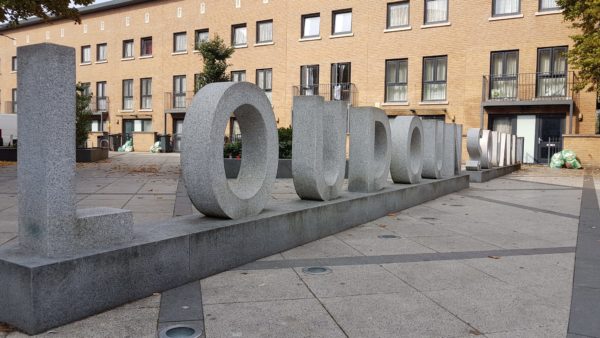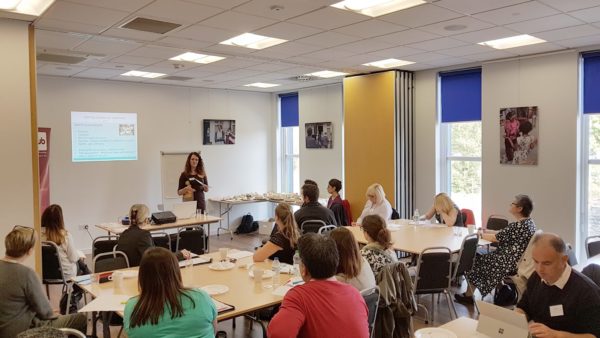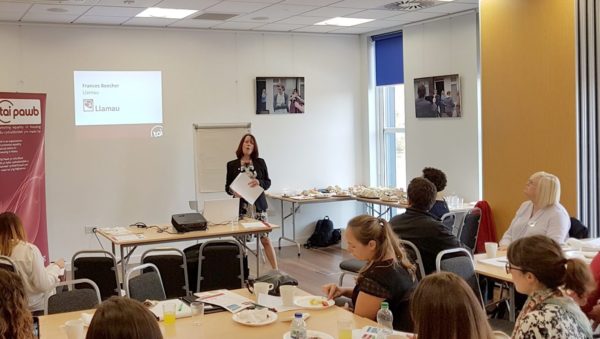Seminar Summary: Fair Share – Equality and Diversity Issues in Shared Housing

Tai Pawb’s most recent seminar focused on equality and diversity issues in Shared Housing.
This was in response to growing concerns in respect of the Local Housing Allowance (LHA) and to highlight good practice examples. The event took place at the Culture and Media Centre, Butetown, Cardiff.
The event also coincided with the launch of our exciting new project Open Doors, which aims to engage and empower tenants and landlords to reduce issues of inequality and discrimination in the private rented sector.
We are incredibly grateful to Julie Nicholas (Monmouthshire Housing) and Oliver Townsend (Cymorth Cymru) for opening the event by speaking about their practical involvement in shared housing and policy work on LHA.
We learnt about Monmouthshire Housing’s pilot project to house tenants under 35 affected by the LHA. The profiling of the tenants comprehensively covers criteria across protected characteristics to lifestyle and values. We heard that an unexpected issue was the difficulty of engaging people under 21 with the issues as it became apparent many often don’t plan for their housing needs beyond a 2-3 year period. The success achieved in encouraging tenants to discuss and agree their own set of house rules and how this allowed everyone to have input and express their shared values was really encouraging.
Oliver Townsend told us about Cymorth’s work with Welsh Government to help protect funding for the Supporting People programme. He urged us to approach our MPs to apply pressure as a sector and offered real examples of how the introduction LHA, a Westminster policy, is adversely impacting the lives of vulnerable people in Wales.

Hazel Davies (Rooms4U – Newydd) shared her experiences of running a similar scheme in the Vale of Glamorgan and told us about the complexities of balancing the information tenant’s provide with the way properties are managed. Hazel explained how a recent negative experience with tenant matching led to an overhaul of the system, leading to positive results. It emerged that a key question to ask when surveying potential residents is “Preference or Prejudice?” This is assessed by the language used to express themselves and by observing body language. The aim is to do intensive work before the beginning of a tenancy in order to get the match right first time. This improves the overall experience for everyone involved and gives the best possible opportunity for tenants to enjoy their new home.
A slightly different voice in the sector came from Kevin Ullah, a local private landlord. Kevin was passionate about being socially responsible and expressed his disappointed with the general lack of engagement from other private landlords. He gave us examples of how he has worked closely with his tenants to support them, when it would have been easier to end their tenancy. This included examples of helping a tenant with their household budget, and eventually reducing their rent when it became obvious they couldn’t afford the current rate. Landlords do not have the skills and access to support and advice, he said, to manage tenants with complex situations and this all too often leads to them being evicted instead of helped. We very much appreciated his passion and willingness to do more and we intend to work more extensively with private landlords through our Open Doors Project.

Frances Beecher also delivered a passionate presentation detailing Llamau‘s work, which includes UK wide research into the mental health of young homeless people. An interesting point raised was that shared housing is not yet seen as the ‘norm’. For most people, it is considered a temporary measure, or a stepping stone. However, Frances explained that with a “tsunami” of young people being affected by Local Housing Allowance who cannot be housed separately, shared housing will increasingly need to be looked to as a means of accommodating this need. Frances also raised questions over the level of profiling imposed upon young people before being allowed to live somewhere, arguing that those from poor backgrounds with little work experience or education are discriminated against.
The Seminar ended with two short workshop sessions in which attendees explored and discussed potential equality issues in two case study scenarios. The level of knowledge and expertise present at the seminar led to highly interesting and informative debate.
We’d like to thank all our speakers for giving their time and input to the seminar and for assisting us in raising the profile of equality and diversity in housing and spreading good practice on Shared Housing policy and practice.
Click here to view the seminar presentation.
If there are equality and diversity issues in housing that you want to learn more about, or have a project you’d love to share, please get in touch!